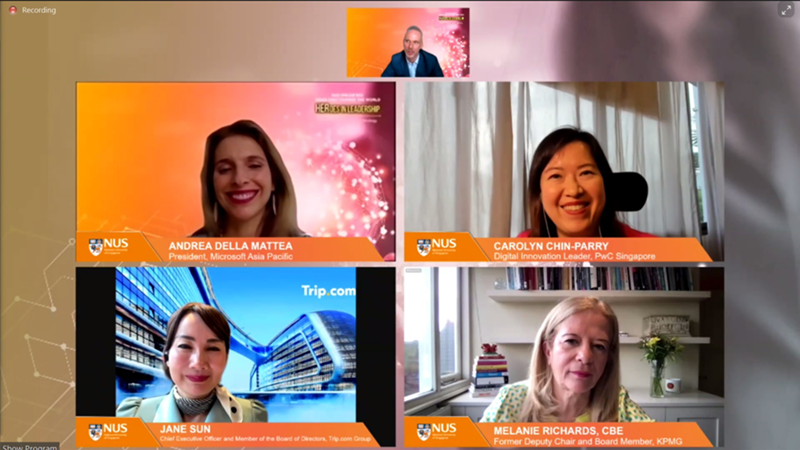
The four panellists shared their insights on a wide range of topics revolving around the empowerment of female leadership in STEM industries, from digital inclusion to role modelling. The discussion was moderated by Prof de Cremer (top).
The 21 April event, HERoes in Leadership, was the first instalment of the NUS Dream Big: Ideas that Change the World series.
It was organised by the NUS Centre on AI Technology for Humankind in collaboration with the NUS School of Continuing and Lifelong Education (SCALE).
“Technology is here. Technology is changing the world,” asserted event moderator Professor David de Cremer, who is Founder and Director of the Centre and Provost Chair and Professor in Management and Organisation at NUS Business School.
Dr Mahak Nagpal, Postdoctoral Research Associate at the Centre, further shared the Centre’s research findings, which showed that tech-savviness is imperative to helping women be recognised as leaders, more so than for men. “Technological innovations are disrupting how organisations function,” she said. “Leaders today need to be tech-savvy enough to facilitate these digital transformations taking place, ensuring that all have a tight enough grasp of technology to be able to leverage it to develop a competitive advantage for their companies.”
Three key strategies to nurture and empower female leaders in a technological era emerged from the spirited discussion that followed.
Facilitating digital inclusion
The first strategy is to facilitate digital inclusion, democratising access to tech training and education to narrow the digital divide and make sure nobody gets left behind in the digital space.
“We need to make sure that a digital world is not going to be less diverse and inclusive,” Ms Carolyn Chin-Parry, Digital Innovation Leader in PwC Singapore and IT Woman of the Year for Asia, stressed. “I believe that through the right type of technology, as well as people's willingness to help out, that this can be done.”
An avid proponent of digital upskilling, she capitalises on her technological experience as a leader to offer courses pro-bono to charities and non-profit organisations, as well as mentor people from less developed countries to counter poverty levels. Within PwC, she has also spearheaded the digital upskilling initiative for its 84,000 employees around the Asia-Pacific region, including data literacy skills, visualisation, analytics, and automation skills.
Ms Melanie Richards, Former Deputy Chair and Board Member of KPMG, and founding member of the 30% Club steering committee, a UK-based initiative promoting gender diversity and leadership, concurred. She underscored the importance of mindful intervention, “to make our organisations stronger, to make them more creative, more collaborative, and most importantly, more inclusive.”
Encouraging women to enter STEM courses and professions
The second strategy is to embolden girls and women to venture into STEM — science, technology, engineering, and mathematics — courses and professions. Referring to a Straits Times article, Ms Chin-Parry observed how there is some leakage in the talent pipeline, where girls in STEM disciplines do not necessarily go on to STEM professions upon graduation.
The importance of encouraging females into STEM disciplines and careers was taken up by Ms Jane Sun, Chief Executive Officer and Director of Trip.com.
“We need to really make the extra effort to encourage female students from the beginning to learn as many STEM classes as possible,” she shared, highlighting the immense opportunity for students who specialise in tech-driven disciplines. “You don’t have to be a coding engineer, but knowing some technology will really widen career options and open doors for you in the future.”
Ms Sun’s words echoed NUS President Professor Tan Eng Chye’s in his opening address, in which he pledged the University’s commitment to supporting and drawing women into academia.